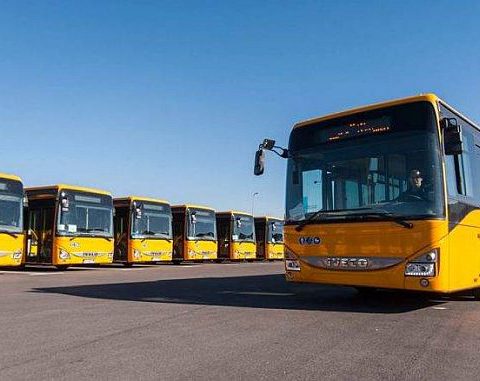EBRD lends up to €10 million to Pristina’s operator for 30 new buses (including the first 6 e-buses in Kosovo)
The European Bank for Reconstruction and Development (EBRD) is providing a senior loan of up to €10 million under the Green Cities framework to Pristina (Kosovo). The loan will be extended to Trafiku Urban, Pristina’s municipal transport company and largest bus operator. It will be used to finance the acquisition of 30 buses, comprising 24 Euro VI […]

The European Bank for Reconstruction and Development (EBRD) is providing a senior loan of up to €10 million under the Green Cities framework to Pristina (Kosovo).
The loan will be extended to Trafiku Urban, Pristina’s municipal transport company and largest bus operator. It will be used to finance the acquisition of 30 buses, comprising 24 Euro VI vehicles and 6 battery electric buses, along with charging infrastructure. The project will introduce electric bus technology to Kosovo for the first time, with the six electric buses operating on a flagship circular route through the centre of the capital city.
The city’s objective “is to increase services and improve the reliability, safety and efficiency of its public transport system. The project will primarily promote the green transition by alleviating the environmental impacts of the urban transport system and reduce greenhouse gas emissions by 76 per cent. The introduction of electric buses and the expansion of the city’s fleet with Euro VI buses will help achieve this by shifting users from polluting minibuses and cars to the new bus services”, EBRD says.
EBRD investments in Kosovo
Technical cooperation assistance for the municipality will include support for project implementation and bus network restructuring, for which a grant of €760,000 will be provided by an international donor, EBRD adds. The company will also spend €1.8 million of its own resources on a cost-sharing contribution to the project and provide in-kind support.
The loan is a follow-on investment in the city, after an initial €10 million was provided to Trafiku Urban in 2016 for the purchase of 51 new diesel buses that met the Euro VI emissions standard. The new finance reaffirms the Bank’s commitment to facilitating a green transition in the Western Balkans.
The project aligns with the Bank’s Country Strategy for Kosovo, which places importance on the increased autonomy of publicly owned companies and sustainable improvements in public services.
To date, the EBRD has invested €625 million in Kosovo. The Bank’s strategic priorities in the country are to promote the green economy, support the competitive development of the private sector and foster regional integration.
EBRD for the implementation of public transport in Kosovo
Susan Goeransson, EBRD Director of Infra Europe, said after the signing: “Promoting the green economy is one of our strategic priorities in Kosovo. We are proud to work with the city of Pristina to improve the transport system and reduce substantially the emissions from air pollutants. By building on the achievements of our previous project with the city and Trafiku Urban, we solidify a successful partnership and reaffirm our strong commitment to Pristina and its citizens.”
Mayor of Pristina Përparim Rama said: “We are very proud to continue our close collaboration with our long-standing partner, the EBRD, in our joint effort towards a green transition. The introduction of the first electric buses to the city and the country is a pivotal moment in this regard. It will have a tangible impact on the lives of our citizens and take meaningful steps towards a healthier and cleaner Pristina.”
Valmira Uka, representing Trafiku Urban, said: “This is a very exciting moment for us, extending a partnership that started back in 2016 with the EBRD. The expansion of our bus fleet will make it possible for us to give the citizens of Pristina a more efficient, reliable and safer transport system. The six electric buses that will operate on a flagship circular route through the city centre are only the first step in our effort to transition to this cleaner mode of transport.”








